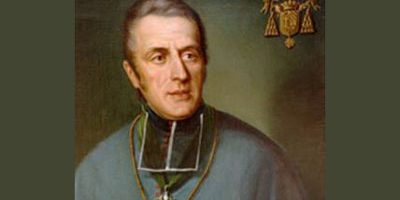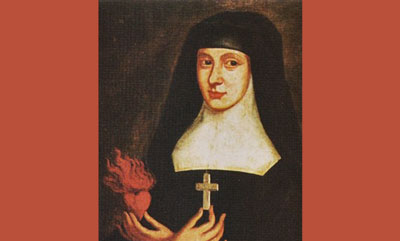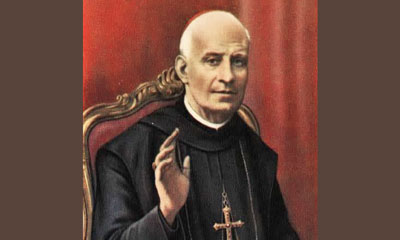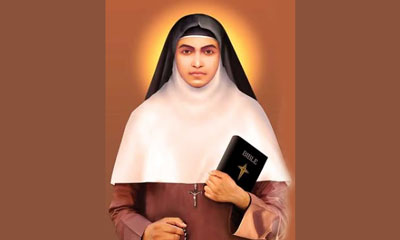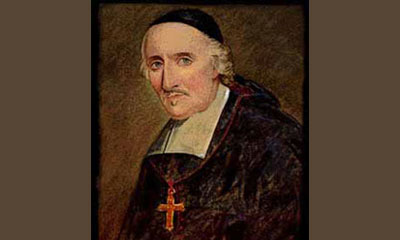October 4, 2017
Saint Eugene de Mazenod
Dear Friends,
At the beginning of August 1847, the apostolic vicar of Ceylon (Sri Lanka), was in France looking for missionaries for his diocese. “Go to Marseilles!” he was advised. “There’s a bishop there with a heart as big as Saint Paul’s—as big as the world… Make him see that it’s a question of saving poor souls, very poor… That will be irresistible to him.” The prelate met with him and made his request. “Alas! How can I respond to your desire?” replied Bishop de Mazenod. The bishop of Ceylon did not hesitate: “But, your Excellency, it is a question of poor souls, the poorest, I assure you… the most unfortunate on earth… for pity’s sake, give them missionaries.” Deeply moved, Bishop de Mazenod opened his arms and embraced his confrere, weeping: “You will have them right away!”
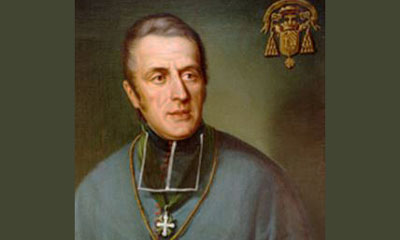 The son of a noble family in Provence, Eugene de Mazenod was born in Aix on August 1, 1782, to Charles Antoine, Lord of Saint Laurent du Verdon and a President of the Court of Finances, and his wife Marie Rose Eugenie Joannis. From his childhood, Eugene showed unusual strength of character. To get what he wanted, he did not cry, but rather, demanded it with an energetic “I want!” At the age of four, he was watching a play with his parents, seated in the balcony. Outraged at the attitude of a spectator in the orchestra who kept whistling at the actors, he cried out, holding out his fist: “You’ll see, if I come down there!” He nevertheless had a very good heart, and did not hesitate to go to great lengths for others. While he was still young, during a visit to some friends of the family as winter was approaching, he was surprised that there was no fire in the hearth. He was told that they were too poor to burn wood every day. Moved with compassion, he hastily left the room and soon returned, pushing with great difficulty a large wheelbarrow full of wood that he triumphantly dumped out in front of the door: “Here’s some wood, warm yourselves now!” Another day, he traded clothes with a little coal miner who was shivering. His mother reprimanded him: “It’s quite inappropriate for the son of a President to be dressed like a coal miner!” His response was: “Well, I will be a President coal miner!”
The son of a noble family in Provence, Eugene de Mazenod was born in Aix on August 1, 1782, to Charles Antoine, Lord of Saint Laurent du Verdon and a President of the Court of Finances, and his wife Marie Rose Eugenie Joannis. From his childhood, Eugene showed unusual strength of character. To get what he wanted, he did not cry, but rather, demanded it with an energetic “I want!” At the age of four, he was watching a play with his parents, seated in the balcony. Outraged at the attitude of a spectator in the orchestra who kept whistling at the actors, he cried out, holding out his fist: “You’ll see, if I come down there!” He nevertheless had a very good heart, and did not hesitate to go to great lengths for others. While he was still young, during a visit to some friends of the family as winter was approaching, he was surprised that there was no fire in the hearth. He was told that they were too poor to burn wood every day. Moved with compassion, he hastily left the room and soon returned, pushing with great difficulty a large wheelbarrow full of wood that he triumphantly dumped out in front of the door: “Here’s some wood, warm yourselves now!” Another day, he traded clothes with a little coal miner who was shivering. His mother reprimanded him: “It’s quite inappropriate for the son of a President to be dressed like a coal miner!” His response was: “Well, I will be a President coal miner!”
End with a priest
In 1789, Eugene was a boarder at the Bourbon College in Aix, when there were rumblings of the Revolution. The President fled to Nice (at that time part of Piedmont) with his family and his brothers, the Chevalier, Naval Captain, and the canon Fortuné, the former Vicar General of Aix. Eugene began to study Italian. When the new school year began in September, the President sent his son to the Royal College in Turin. In spite of the initial language handicap, Eugene was first in his class. Soon, pushed out by the armies of the Revolution, the Mazenods also arrived in Turin. They took part in the circles of resistance that the émigré nobility formed in hopes of restoring the monarchy. But in 1794, they had to flee again, this time as far as Venice. To earn their living, the Mazenod brothers became businessmen. Eugene was then left to his own devices. But Providence was watching over him—a holy priest, Don Bartolo Zinelli, allowed him to continue his studies without payment, and brought him into the home of his own parents, who treated him like a son. The rhythm of study, pious exercises, and wholesome recreation kept the lad from bad influences. The priest gave him this watchword: “Nothing against God, nothing without God.” A vocation to the priesthood awakened in Eugene. To test him, his great-uncle, the former Vicar General of Marseilles, asked him: “Do you not know that you are the last offspring of the family, and that you must continue the family name?” A little annoyed, Eugene replied, “So what? Would it not be an honor for our family line to end with a priest?”
The armies of the Republic, led by General Bonaparte, were still advancing. In 1797, the Mazenods were forced to flee to Naples, then Palermo. For Eugene, life was very pleasant among the Sicilian nobility. Amidst parties and social gatherings, he resumed his literary and historical studies, but by the end of his stay in Sicily, romantic readings had appreciably diminished his faith. A concordat was signed in 1801 between Napoleon and Pope Pius VII. The following year, Eugene returned to France, where noisy and worldly amusements increased his uneasiness. He tried to marry, but it fell through. In 1807, Eugene read The Genius of Christianity by Chateaubriand. This work seemed superficial to him: “The Christian faith must not rest on the shifting sands of sentimental impressions,” he noted, “but on the steady rock of classic rational proofs.” It was with this orientation that he devoted himself to study, to respond in particular to Jansenist arguments from a family member. One Good Friday, he was granted the grace of conversion: “I have searched for happiness outside God, to my unhappiness,” he later wrote in retreat notes. “How many times in my past life did my tormented heart soar towards God, from whom it had turned away!… During this liturgy, my soul soared towards its final end, God, the loss of whom it vividly perceived.” After careful deliberation, he set his sights on the Saint Sulpice seminary in Paris, and wrote to his mother: “The Lord wishes that I renounce a world in which it is nearly impossible to save oneself, so much does apostasy reign, and that I dedicate myself to rekindle the faith that has faded among the poor, for His glory and the salvation of the souls He has redeemed with His precious Blood.”
Unsolvable question
Under the direction of Monsieur Emery, Superior of the Society of Priests of Saint Sulpice, Eugene made rapid progress in ecclesiastical studies and the interior life. He maintained a strict asceticism, and opened his heart to social classes that he had until now considered inferior, from which many of his fellow students came. His zeal for the missions was stirred through contact with fervent companions such as Forbin-Janson, the future bishop of Nancy and founder of the Association of the Holy Childhood. Due to the needs of the times, studies were reduced to three years, with emphasis placed on apologetics (explaining the rational basis for the faith) and morality. Focusing on his future ministry, Eugene did not seek to acquire knowledge for its own sake. In the margin of one of his courses on contracts, he noted, “All this bores me”; and regarding a controversy over the means of the sacraments’ efficacy: “Unsolvable and inutilissime (most useless) question.”
During the captivity that Napoleon imposed on Pope Pius VII and the Roman Curia (1809-1814), Eugene served as a liaison to Father Emery, the soul of the Catholic resistance. Eugene would later confide to a bishop friend: “First as only a deacon, and then a young priest, I was asked to, in spite of police surveilling me from the shadows, devote myself daily to the service of the Roman cardinals, at the time taken to Paris and soon after persecuted on account of their faithfulness to the Holy See. The dangers to which I was constantly exposed were compensated for by the happiness in my soul of being useful to these illustrious exiles, and of being inspired ever more by their spirit.” The Sulpician teachers, who did not hide their opposition to the emperor’s actions, were expelled from the seminary. They left only after having secretly named their replacements—among them, Eugene fulfilled the role of director. The young deacon nevertheless refused to be ordained to the priesthood by the archbishop of Paris, who had been appointed by Napoleon without the Pope’s approval, going instead to a friend of his great-uncle, the former bishop of Amiens. After his ordination on December 21, 1811, this prelate suggested that he become his vicar general with right of succession, but the new priest refused the offer in order to carry out the duty that his teachers had given for a year, and above all, to continue to be free to evangelize the poor, in keeping with the motto he would later adopt: Pauperes evangelizare (cf. Lk 4:18).
“
My respectable brothers”
Father de Mazenod returned to Aix-en-Provence a year later. He gave his first sermon in Provençal so that the least educated might be able to understand. His warm words set hearts on fire. “What are you in the eyes of the world? Despised men… My brothers, my dear brothers, my respectable brothers, in the eyes of faith you are children of God, brothers of Jesus Christ, heirs to the eternal kingdom.” The young priest took the education of children to heart, for he saw a generation being raised that did not know even the name of God. “The undertaking is difficult,” he admitted, “I am not deceiving myself. It is even not without danger, since I am proposing nothing less than to thwart with all my power the sinister designs of a suspicious government, which persecutes and destroys all that does not support it. But I fear nothing, because I place all my trust in God.” He soon found himself forming in piety about twenty youth, whom he loved like a father, under cover of playing sports. His dedication to prisoners resulted in his contracting typhus. For forty days, he was on the verge of death. But thanks to the prayers of his “children,” who, with their savings, had Masses said for him, rising an hour earlier to attend them without interfering with their studies, his health returned.
In 1814, Napoleon’s empire collapsed. Eugene was finally able to expand his efforts on behalf of youth and give missions in rural parishes. In his heart was born the plan for a community that would be dedicated to parish missions as well as the formation of the clergy. On January 25, 1816, he founded, with four confreres, the “Missionaries of Provence,” and set them up in a former Carmelite convent. The new community was not under the authority of the parish priests, which stirred a reaction from some of them—they accused Father de Mazenod of interfering, because the youth they were evangelizing, now numbering over three hundred, came from the parishes. But the priest intended to protect his boys from the dissipation and irregularity that prevailed elsewhere.
The parish missions increased, lasting from four to five weeks. In the mornings, the Credo, the sacraments, God’s commandments, and the Our Father were taught. In the evenings, sermons were preached on death, judgment, hell, purgatory, heaven. Confessions occupied seven priests from five o’clock in the morning to midnight, for over a week. In eight years, forty parishes were renewed. “Religion,” he declared, “had been lost in this land without missions; now it has triumphed.”
Thinking about final ends helps us to grasp what is at stake in the actions we freely choose in this world. Now is the time that the choice is made between the way of eternal life and that of eternal perdition, as Saint Paul emphasizes: Do not be deceived; God is not mocked, for whatever a man sows, that he will also reap. For he who sows to his own flesh will from the flesh reap corruption; but he who sows to the Spirit will from the Spirit reap eternal life… So then, as we have opportunity, let us do good to all men, and especially to those who are of the household of faith (Gal. 6:7-8, 10). Similarly, Pope Paul VI declared, “One of the fundamental principles of Christian life is that it must be lived in the light of its future and eternal destiny” (Audience of April 28, 1971).
Painful inaction
In spite of his humility, the young priest had kept his aristocratic airs and a peremptory manner that earned him lasting animosity. However, he was ever concerned about strengthening his community, which could only survive with the support of a vicar general. So he tried to obtain royal approval, but in vain. He then thought of pulling a few strings with his Parisian relatives so that his uncle Fortuné might be offered one of the episcopal seats in Provence, and could support the community. Once the offer was made, his uncle would not dare offend the king by refusing the position. After all efforts seemed to have failed, Fortuné was finally named to the bishopric of Marseilles. However, for six years he had to remain at the Carmelite convent in Aix-en-Provence, because the government intended to eliminate the episcopal see of Marseilles.
On August 16, 1818, the bishop of Digne called upon the Missionaries of Provence to manage the Marian sanctuary of Our Lady of Laus, in the Alps. This new mission resulted in the elevation of the Society to a Congregation bound by vows, so as to ensure the unity of the two houses. Father de Mazenod wrote the new congregation’s Rules. They state: “The Church, that glorious inheritance purchased by Christ the Savior at the cost of His own blood, has in our days been cruelly ravaged… Except for the sacred deposit of faith that will be preserved intact until the end of time, Christianity is but little more than a shadow of what it once was. … What did our Lord Jesus Christ do? He chose a number of apostles and disciples, whom he filled with His spirit… and he sent them to conquer the world, which was soon submitted to His holy laws. What must we do in turn to succeed in reconquering for Jesus Christ so many souls who have thrown off His yoke? We must work seriously at becoming saints…having solely in view the glory of God, the building up of the Church, and the salvation of souls…and then, full of confidence in God, we must enter the arena and fight, even unto death, for the greater glory of God. What a noble enterprise!”
In 1821, the community adopted the three vows of poverty, chastity, and obedience, and, in spite of a passing crisis, emerged strengthened. A third house was founded in Marseilles and novices arrived. In 1823, the decision was made that the city would maintain its episcopal see, and Fortuné de Mazenod’s nomination was confirmed. Eugene and his closest collaborator became vicar generals of the diocese. This responsibility entailed a great deal of office work that he found disagreeable, but he offered it to the Lord in reparation for his sins, in the bitterness of finding himself far from the missions. On February 17, 1826, the Rules received approval from Pope Leo XII, who sanctioned the Society’s new name: “Oblates of Mary Immaculate.” “This name satisfies the heart and ear,” wrote the superior to his sons… “Let us rejoice to bear the name of Mary and Her livery… In the name of God, let us be saints!” In 1829, a serious illness brought him to death’s door. He recovered, but had to spend his convalescence in Switzerland, where the Paris revolution of 1830 forced him to prolong his stay. Since parish missions were completely forbidden by the new government of France, he resolved to send the Oblates to work in foreign missions, for, he declared, “A new Congregation must have an element of zeal—inaction would be deadly.”
“
My happiness and my joy”
In May 1831, the city council of Marseilles and the general council voted to abolish the episcopal see as soon as it became vacant. To avoid this, Bishop Fortuné de Mazenod had Pope Gregory XVI grant the elevation of his nephew to the episcopacy, with right of succession. Eugene went to Rome, where he was consecrated a bishop on October 1, 1832. He turned toward God: “Nothing happens to me without Your wanting it, and my happiness and joy will always be to do Your will.” Upon his return to France, he carried out his ministry without having been appointed by King Louis-Philippe and as a consequence, was attacked by the administration. He boldly defended himself before the courts. However, the Holy See, deeming it preferable, asked him to temporarily retire. It was a harsh blow, but he complied nevertheless, suffering, and abandoned himself to Providence. In 1837, Bishop Fortuné de Mazenod stepped down, and Eugene succeeded him as Bishop of Marseilles.
During his episcopacy, which lasted twenty-three years, Bishop Eugene de Mazenod was devoted to his people, whom he himself taught in Provençal, and to his clergy, whose formation he personally supervised. He encouraged priests to live in small communities. Their number went from 171 at the beginning of his episcopacy to 378 twenty years later. The prelate founded twenty-two new parishes, built or renovated forty churches, and constructed a new cathedral as well as the spectacular basilica Notre Dame de la Garde which overlooks the city. Ten religious communities for men and sixteen for women were welcomed to or instituted in the diocese. “My system is to support the zeal of all those who wish to consecrate themselves to a life of perfection… Should these various associations live only as long as do those who are dedicated to God within them, it would still be a great benefit.”
He encouraged Eucharistic adoration, and restored the Roman liturgy in its fullness. Bishop de Mazenod also took an active role in fighting for the freedom of secondary education. Since the French Revolution, secondary education had been monopolized by the University, which was secular and dominated by anticlericals. The bishop thought “that if French youth continue to be raised by the University, the day will come when the faith will be almost entirely gone in France.” Since the stakes were of paramount importance in his eyes, he joined the movement for the freedom of education, alongside such Bishops as Pie and Dupanloup, and journalists like Louis Veuillot and Montalembert. He attempted to unite the bishops so they would lose their reticence and be led to common action: “No isolated protests; let everyone explode in full day! Only the entire episcopacy’s recourse to the use of publicity” can draw the attention of the authorities, and force them to come to a definitive decision. More than ever, the newspapers are “today the great means of making oneself heard.” He emphasized that the bishops are not “subordinates who make humble requests of those in power,” but the “defenders [and] guardians, for and against all, of the rights and interests of the Church.”
In our times, the Second Vatican Council has reminded us of this right to a due freedom to educate: “Parents who have the primary and inalienable right and duty to educate their children must enjoy true liberty in their choice of schools. Consequently, the public power, which has the obligation to protect and defend the rights of citizens, must see to it, in its concern for distributive justice, that public subsidies are paid out in such a way that parents are truly free to choose according to their conscience the schools they want for their children. … Therefore the state must … promote the whole school project. But it must always keep in mind the principle of subsidiarity so that there is no kind of school monopoly, for this is opposed to the native rights of the human person, to the development and spread of culture, to the peaceful association of citizens” (Declaration Gravissimum educationis, no. 6)
The most difficult missions
The bishop of Marseilles patiently applied himself to mastering his difficult personality, and administered his diocese with inspired wisdom and firm kindness. Remaining as superior of the Oblates of Mary Immaculate, he seized the opportunities that presented themselves to multiply the foundations in France, Great Britain, and Ireland. Between 1841 and 1847, he sent his sons to North America, particularly to still unexplored areas in Canada, and to Asia (Ceylon) and Africa (Natal). His zeal for the salvation of souls pressed him to accept the most difficult missions. The Oblates made their Father’s missionary initiatives known broadly, in parishes as well as seminaries, and candidates poured in—there were 115 postulants for the year 1847-48. In 1861, Bishop de Mazenod could count 414 oblates, including six bishops, at work on four continents, as well as 69 oblates who had already died. The founder had given the impetus to his magnificent congregation, without neglecting to endow it with the legal and human structure necessary for it to survive without him. He remained close to his sons through correspondence, and above all before the Blessed Sacrament: “It is there that we meet one another,” he wrote to them, full of gratitude for their devotion. He loved each of them with an immense love that he could only explain as a miracle of the loving Heart of Jesus. Broken by the years and labors, the bishop of Marseilles endured his final illness with courage, before dying on May 21, 1861. He was canonized by Saint John Paul II, on December 3, 1995.
The testament left by Saint Eugene de Mazenod to his spiritual sons is also a light to illumine our path: “Practice well among yourselves charity, charity, charity, and outside, zeal for the salvation of souls!”


